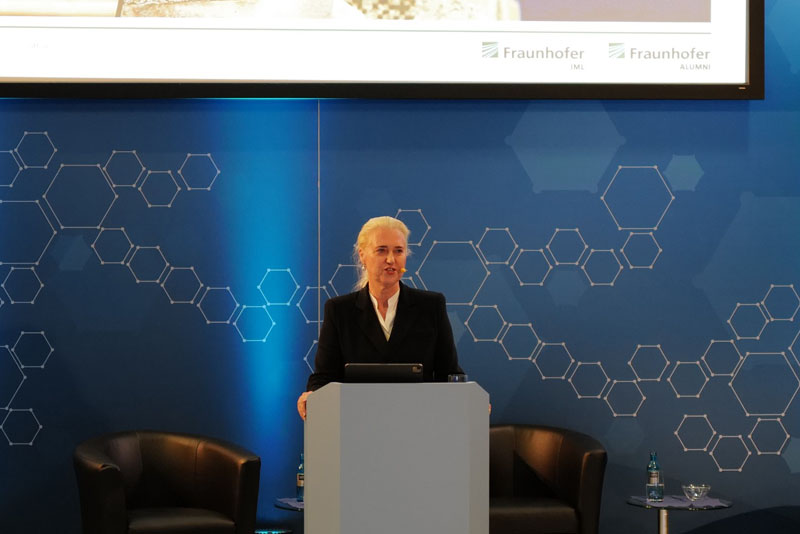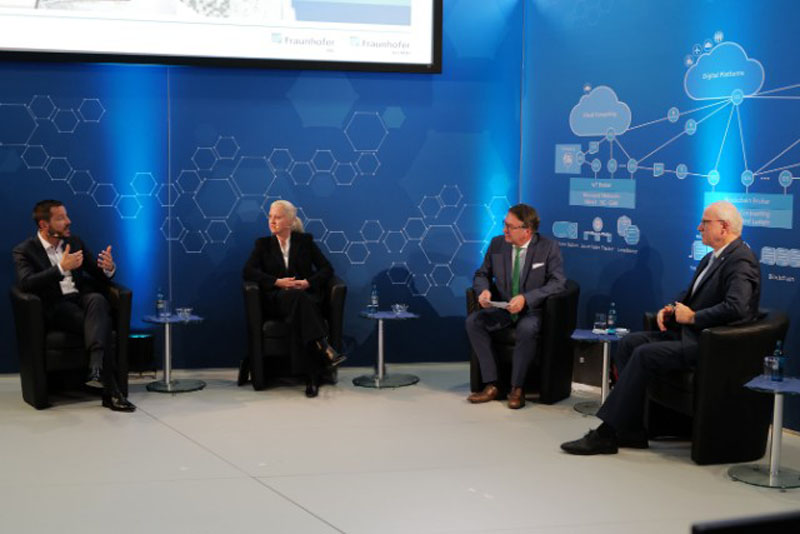Ordered today, delivered tomorrow. This level of convenience has long been taken for granted in today’s consumer society. However, many essential factors are required in order to maintain this standard, one of the most important of which is stable supply chains. In today’s collaborative and highly networked world, disruptions to supply chains have far-reaching consequences. Logistics, therefore, is the backbone and “enabler” of society, and the supply bottlenecks in recent months are just the latest in a series of events that have increasingly brought it to the attention of the general public. At the same time, this industry has been gaining in societal and economic importance.
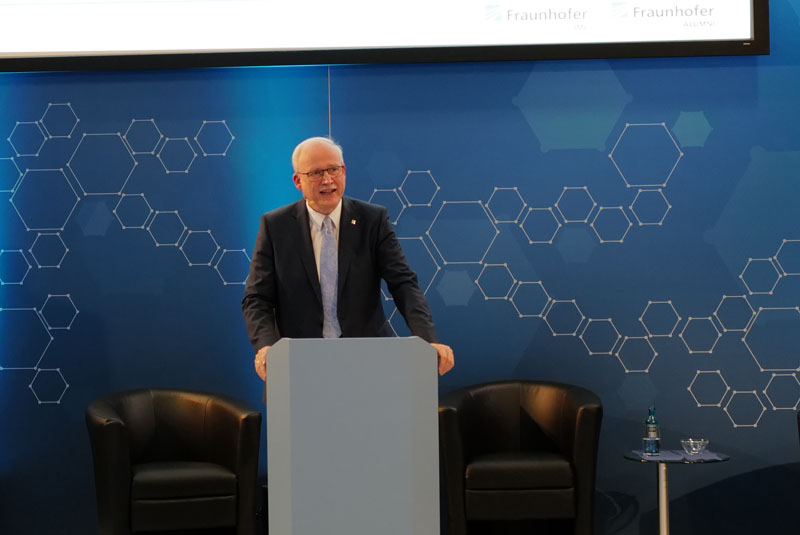
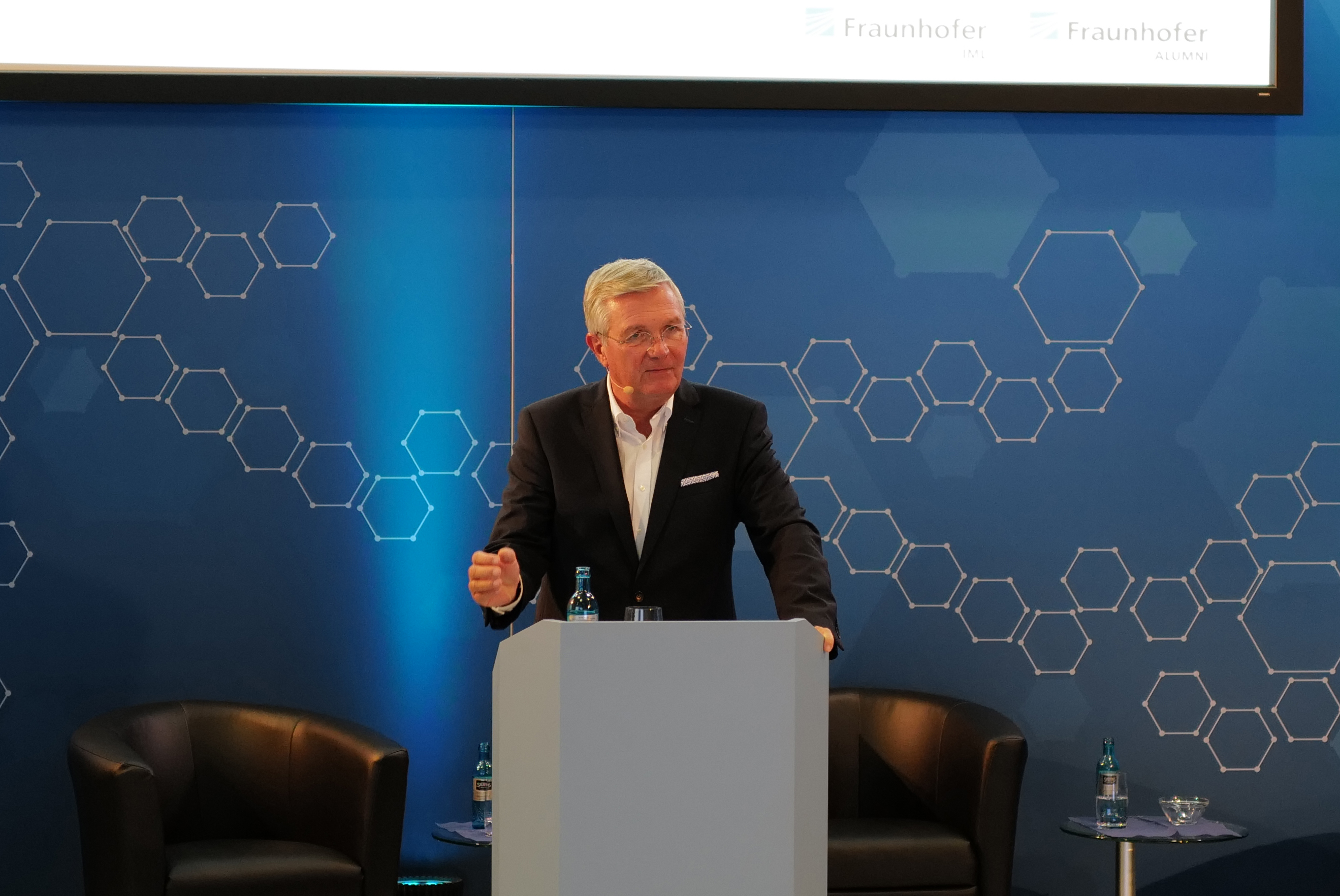
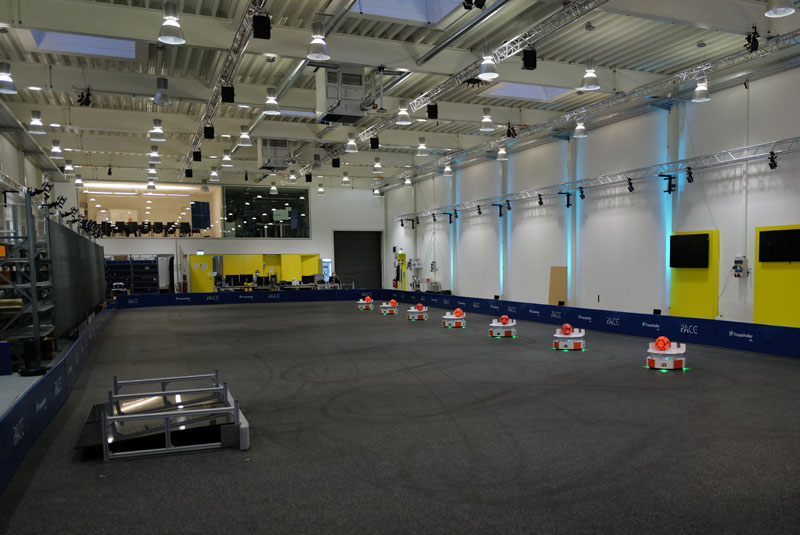
In line with the topic “The Future of Logistics”, the 5th Fraunhofer Alumni Summit was held at the Fraunhofer Institute for Material Flow and Logistics IML in Dortmund on November 5. For the first time, the Fraunhofer-Alumni e. V. hosted the summit as a hybrid event. The speakers were present on site, while spectators were able to stream the event digitally due to the current pandemic situation.
The Dortmund site was established in 1981 under the name “Fraunhofer Institute for Transport Technology and Goods Distribution ITW.” Today, more than 330 scientists and 250 doctoral candidates and students carry out their work and research there, with the support of still more colleagues in workshops, laboratories and service departments. Fraunhofer IML has given rise to developments ranging from electronics to sensors and new drive technologies, and from areas such as swarm robotics, artificial intelligence, image recognition and blockchain to standardization issues and open source. Many of these developments from the Dortmund-based institute are now on the market and are being put to positive uses.
“For the Fraunhofer-Gesellschaft, logistics is very important as a cross-sectional science,” explains Prof. Alexander Kurz, Executive Vice President of the Fraunhofer-Gesellschaft and Chair of the Executive Board of the Fraunhofer-Alumni e. V. “As one of the world’s leading logistical institutes, with research into areas such as artificial intelligence, deep learning blockchain and even materials and product sciences, Fraunhofer IML fits perfectly into the ‘expertise mix’ of the Fraunhofer-Gesellschaft,” continues Prof. Kurz.
“100 percent logistics”
“One-hundred percent logistics” is the claim made by Fraunhofer IML, according to Prof. Uwe Clausen, Institute Director of Fraunhofer IML. “Among other things, we deal with intralogistics, transportation, supply chain management and materials-cycle management, by land, water and air. We connect transport routes with innovative technologies,” Clausen concludes.
“The digitalization of everything and artificial intelligence in everything will change everything, including in logistics,” says Prof. Michael ten Hompel, Executive Director of Fraunhofer IML. He explains that the world is now divided into “digital and non-digital.” ten Hompel is convinced that, in an increasingly networked and digitalized world that is producing more and more data at an ever faster rate, logistics will continue to grow in importance. On the other hand, ten Hompel does not believe that individual players will be able to hold their ground in this new situation: “When it comes to data, it will be communities that strike gold.”
Researchers describe the interaction of technologies such as blockchain, digital ecosystems, humanoid robots and simulated and augmented realities collectively using the term “silicon economy.” Information is an essential part of this new economic system. Even today, intangible assets are already the most valuable items on the balance sheets of the world’s largest businesses. “Data is increasingly becoming a central asset. In the future, the logistics sector will be able to profit from what is known as information asymmetry,” ten Hompel predicts.
Platform economics, open innovation and silicon economy
This development is also an important element of platform economics, from which large digital platforms in the United States and China are drawing most of the benefits. European companies have a relatively small share of market capitalization in this area. “When it comes to digitalization, the playing field is increasingly being defined by AI, but also by open source,” ten Hompel emphasizes. Developer communities such as github, Pytorch or Tensorflow are predominantly influenced by the United States, for example. At the same time, however, ten Hompel believes that these types of community present opportunities for European initiatives, which can develop new business models more quickly on the basis of open platforms and interfaces.
There are many different developments underway simultaneously. Industrie 4.0, real-time-capable 5G networking, AI-based platforms, blockchain and other technologies are allowing products to negotiate with each other autonomously rather than needing to go through humans. The researchers’ vision is that, in the future, companies will buy and sell data, services and goods automatically via blockchain. Contracts will then be entered into by algorithms and not by humans.
For this to work, however, suitable standards and frameworks are needed to ensure data sovereignty. These could be established by initiatives like International Data Space or GAIA-X.
With the Rhenus level sensor ITCPRO (Intelligent Tracking Control Professional), Fraunhofer IML is showing how this kind of automated contract signing can work in practice today. The paper receptacles developed by Rhenus AG use a sensor developed by Fraunhofer IML to decide whether to order a truck to empty them. An invoice is then issued and paid automatically. “The receptacles are the administering authority in this example,” says ten Hompel.
Although a lot of money has been invested in this development, Rhenus AG will be making it generally available as an open source technology. “We aim to establish common standards through open interfaces. We are pursuing new forms of collaboration, because no business can implement the silicon economy on its own. That can only be done in a federal ecosystem of industry and science and on the basis of de facto standards and open source,” explains ten Hompel.
The founding of the Open Logistics Foundation, which Fraunhofer IML was involved in initiating, was a logical step toward achieving this. The purpose of this charitable foundation is to promote a European open source community for digitalization in logistics and supply chain management and to establish de facto standards for logistical processes. ten Hompel summarizes it as follows: “Let’s work together to find solutions. There are major challenges facing us, and it’s time to come together.”
The Port of Hamburg’s status as a gateway to the future is in no small part thanks to the Fraunhofer-Gesellschaft and its work on a joint project that has developed, among other things, an image recognition system to monitor the status of containers.

